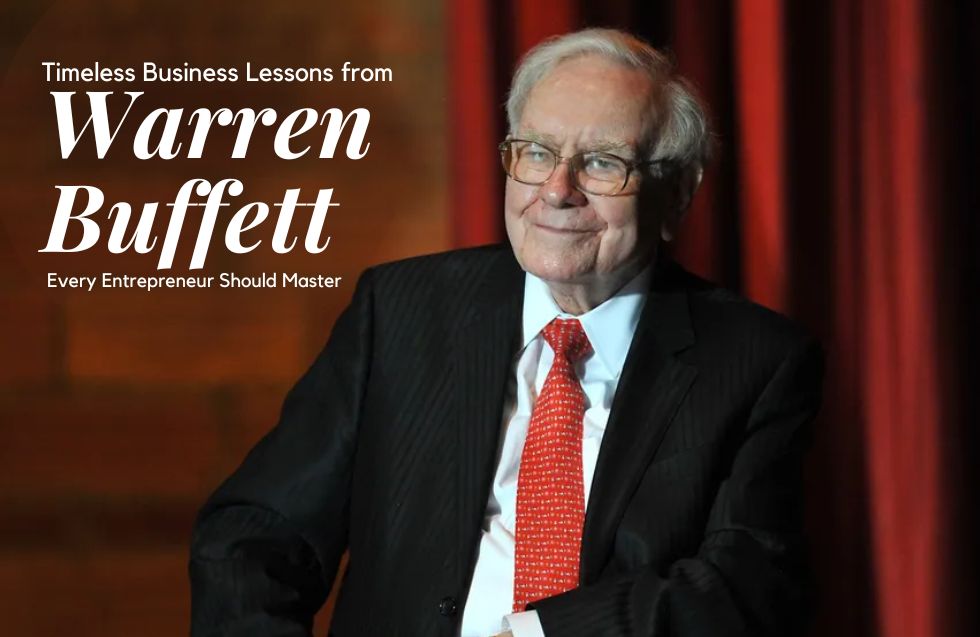Warren Buffett, often called the “Oracle of Omaha,” is not just a master investor but also a profoundly wise businessman whose principles have inspired entrepreneurs worldwide. With a career spanning over seven decades, Buffett has built one of the world’s most successful investment firms, Berkshire Hathaway, and amassed a net worth of over $100 billion. Yet, his approach to business is as humble as it is effective, focusing on long-term value, disciplined decision-making, and ethical leadership.
For aspiring and seasoned entrepreneurs alike, Buffett’s business wisdom offers a wealth of insights that can be applied across industries and business models. In this article, we’ll delve into key business lessons from Warren Buffett that every entrepreneur should master for sustainable success.
1. Prioritize Value Over Price
One of Warren Buffett core investing principles is to focus on value rather than price. He famously said, “Price is what you pay; value is what you get.” This philosophy extends beyond investing and applies to how businesses should approach everything from product development to customer acquisition.
Application for Entrepreneurs:
In business, it’s easy to get drawn into price wars or focus on short-term cost savings. However, Warren Buffett advises entrepreneurs to focus on delivering high value. Whether you’re developing a product or offering a service, aim to create something that will genuinely benefit customers in the long run, even if it’s initially more expensive to produce. By prioritizing value, companies can build a loyal customer base and establish a reputation for quality, leading to sustained profitability.
Real-World Example:
Apple has exemplified this value-driven approach by pricing its products higher than competitors but offering innovative, reliable, and beautifully designed products. The brand’s focus on quality and customer satisfaction has made it one of the most valuable companies globally, with a loyal customer base that values its products despite the premium price.
2. Invest in Knowledge and Keep Learning
Warren Buffett is famous for his voracious reading habit; he spends 80% of his day reading and has emphasized the importance of continuous learning throughout his career. He believes that knowledge compounds over time, much like investments, and has said, “The more you learn, the more you earn.”
Application for Entrepreneurs:
In a rapidly evolving business landscape, knowledge is a competitive advantage. Entrepreneurs should adopt a learning mindset, staying updated with industry trends, competitor moves, and emerging technologies. Whether it’s reading industry reports, books, or attending conferences, continuous learning can provide insights that spark innovation and drive strategic decision-making.
Statistics:
According to Forbes, CEOs of the most successful companies read an average of 60 books per year, compared to the average adult who reads only four. This commitment to learning helps entrepreneurs stay ahead of the curve and make informed decisions in uncertain times.
3. Practice Patience and Think Long-Term
Warren Buffett long-term investment strategy is legendary, as he focuses on the potential of a business over decades rather than reacting to short-term fluctuations. He once advised, “Our favorite holding period is forever.”
Application for Entrepreneurs:
Warren Buffett approach underscores the importance of patience and long-term thinking in business. Entrepreneurs often feel pressured to show quick results, but lasting success requires a long-term vision and the patience to build a strong foundation. Instead of reacting impulsively to short-term challenges or economic fluctuations, focus on strategic goals and steady progress.
Real-World Example:
Amazon’s Jeff Bezos famously adopted a long-term perspective, reinvesting profits back into the company for years to grow its infrastructure and market reach rather than focusing on immediate profits. This long-term focus helped Amazon become the e-commerce and cloud computing giant it is today.
4. Focus on Your Circle of Competence
Warren Buffett emphasizes investing within your “circle of competence”—areas where you have genuine expertise. He explains, “You don’t have to be an expert on every company or even many. You only have to be able to evaluate companies within your circle of competence.”
Application for Entrepreneurs:
For entrepreneurs, staying within their circle of competence can prevent costly mistakes. Trying to operate outside of your core strengths can spread resources thin and lead to subpar offerings. Instead, concentrate on areas where you have a competitive advantage and expand gradually as you build expertise. A deep understanding of your product or industry gives you a solid foundation to make sound business decisions.
Real-World Example:
Southwest Airlines has thrived by sticking to its circle of competence—budget air travel. By focusing solely on efficient, low-cost service and avoiding the complexity of international flights, Southwest maintains high profitability and customer satisfaction in a highly competitive industry.
5. Build a Strong Reputation
Warren Buffett emphasizes the value of a strong reputation, once saying, “It takes 20 years to build a reputation and five minutes to ruin it.” For him, integrity and trustworthiness are fundamental principles in business.
Application for Entrepreneurs:
Building and maintaining a strong reputation is critical to long-term business success. Uphold ethical standards, deliver on promises, and be transparent in dealings with customers, employees, and stakeholders. A good reputation attracts not only customers but also talented employees and investors who believe in your vision and integrity.
Statistics:
A study by Nielsen found that 73% of consumers worldwide are willing to pay more for products and services from companies with a strong reputation for corporate social responsibility. This underscores how essential reputation is in influencing customer behavior and loyalty.
6. Keep Things Simple and Stick to Fundamentals
Warren Buffett is known for his straightforward approach to business, avoiding complexity for the sake of clarity. He believes that businesses should stick to their core fundamentals and avoid overly complex strategies that can lead to confusion or mismanagement.
Application for Entrepreneurs:
Entrepreneurs often feel pressure to adopt the latest trends or tech buzzwords, but Buffett’s advice is to keep things simple and focus on fundamentals. Avoid over-complicating your business model; prioritize clarity, streamlined operations, and efficiency. Simplicity in business practices and communication fosters better decision-making, easier execution, and higher productivity.
Real-World Example:
Costco has thrived with a straightforward business model—offering a limited selection of high-quality goods at low prices. This simplicity allows the company to focus on efficiency and customer satisfaction, leading to consistent growth and profitability.
7. Hire Smart and Trustworthy People
Warren Buffett places immense value on hiring smart, honest, and hardworking people. He once stated, “Somebody once said that in looking for people to hire, you look for three qualities: integrity, intelligence, and energy. And if they don’t have the first, the other two will kill you.”
Application for Entrepreneurs:
For entrepreneurs, building a team with integrity and competence is crucial to business success. Trustworthy employees who share your values can drive the business forward, while poor hires can derail growth. Focus on hiring individuals who are not only skilled but also aligned with the company’s mission and ethics, creating a strong, cohesive work culture.
Statistics:
A report by Harvard Business Review found that high-performing teams outperform low-performing teams by nearly 10 times. Building a strong, ethical team with shared values fosters greater productivity, morale, and alignment with business goals.
8. Adaptability and Willingness to Change
Although Buffett has a strong long-term vision, he is also adaptable. He acknowledges that sometimes, the best decision is to pivot or change course when necessary. He once said, “The most important quality for an investor is temperament, not intellect,” highlighting the importance of adaptability.
Application for Entrepreneurs:
In business, adaptability is key. Markets, technologies, and customer preferences evolve, and entrepreneurs need to be open to change. While long-term planning is essential, flexibility is equally important. Being willing to pivot or innovate when necessary allows companies to stay relevant and seize new opportunities.
Real-World Example:
Netflix is an excellent example of adaptability. Originally a DVD rental service, Netflix pivoted to online streaming as the market shifted, and later, to original content production. This adaptability helped Netflix become a leading global entertainment provider.
9. Be Disciplined with Spending and Avoid Unnecessary Debt
Buffett is famously frugal, despite his wealth, and advocates for disciplined spending and cautious use of debt. He advises, “Do not save what is left after spending; instead spend what is left after saving.”
Application for Entrepreneurs:
Entrepreneurs should cultivate financial discipline, focusing on efficient use of resources and avoiding unnecessary debt. In the early stages of a business, it’s especially important to keep costs under control. Building a lean, financially healthy business ensures sustainability and provides a buffer during tough times.
Statistics:
According to a U.S. Bank study, 82% of small business failures are due to poor cash flow management. Financial discipline and careful debt management are crucial for entrepreneurs to avoid becoming part of this statistic.
Conclusion: The Legacy of Warren Buffett’s Business Wisdom
Warren Buffett’s timeless principles offer invaluable guidance for entrepreneurs aiming to build sustainable, ethical, and resilient businesses. By focusing on long-term value, continuous learning, integrity, simplicity, and financial discipline, entrepreneurs can navigate the complexities of the business world with a clear vision and purpose.
While the business landscape continues to evolve, Warren Buffett approach serves as a reminder that core principles often outlast trends. His philosophy encourages entrepreneurs to make thoughtful, ethical, and value-driven decisions that not only drive financial success but also build a legacy of trust and excellence. For those looking to emulate the Oracle of Omaha, these lessons are not only a roadmap to business success but also to becoming a respected, well-rounded leader.













